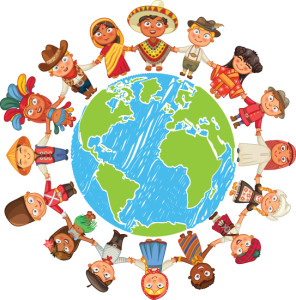Speech Tips
English Communication- Get Best Body Language for Face-to-Face Communication (and Interviews)
English Communication- Get Best Body Language for Face-to-Face Communication (and Interviews)
What’s the most important body language during face to face communication – especially job interviews?
You have a core feeling about how important the communication of your body is to the other person. Here are some body language tips to give you the confidence you want for making that first great impression.
- Make your handshake firm and solid. Keep the wrist straight with no bend. In the US culture, the robust, muscular handshake indicates confidence and self-assurance. If you come from a culture where the polite handshake is gentle and very relaxed, be sure to practice your handshake with others to get exactly the right amount of stiff and muscle tone to convey confidence – but not be overwhelming.
- Once you have entered the room, do not adjust your clothes. Check your clothes before the appointment. Adjusting your clothes can be interpreted as lack of self confidence.
- When seated, make a good posture. Slouching makes a person seem disinterested, bored, and unprepared.
- Keep your arms in an open position, and don’t fold your arms across your chest. To others that is a signal that you are not flexible and perhaps have a stubborn or belligerent (i.e., warlike) personality.
- Do not rub your neck or back of your head. Others interpret that as your being distracted or uninterested.
- Be certain not to overdo on perfume or cologne. In fact, general consensus these days is to not wear any. That’s because a fragrance wonderful to one person may not smell good at all to another. Or the other person, or interviewer, may have allergies affected by the scent.
Be sure to watch our English Speech Tips videos and Accent Reduction Tip videos for more English pronunciation and accent reduction exercise.
Check out our new advanced weekly speech tip program, our new subscription called ClearTalk Weekly, www.subscription.cleartalkmastery.com
Rerun from March 30, 2016
Death of Fear
Death of Fear
Seek opportunities to speak. Ralph Waldo Emerson said, “Do the thing you fear to do and the death of that fear is certain.”
Rerun from April 14, 2016
English Communication: Change in the World’s 7000 Languages and What Happens When Languages Die
English Communication: Change in the World’s 7000 Languages and What Happens When Languages Die
Here’s some more information about the world’s current 7000 languages – information all communicating human beings should know.
English is the lingua franca of our digital age. Those who use it as a second language may outnumber its native speakers by hundreds of millions.
Heterogeneity of dialects and language isolates arises from geographic isolation of small groups. In other words, dialects and languages develop when small groups of people live in areas without exposure to other groups. That was probably true of Paleolithic hunters,
Nowadays, the most concentrated cluster of 800 languages exists in Papua New Guinea with its isolated small groups living in highlands and rain forests.
Linguists estimate that by the end of this century, as many as fifty percent of the world’s 7,000 languages will, at best, exist only on recordings and in archives.
Why the death of so many languages? Throughout the world, people are turning from their ancestral languages to the dominant language of their region’s majority. In other words, people, especially young people, are stopping speaking in the language of their grandparents and parents and talking only in the language taught in school and used in business—the dominant language. In South America, the dominant language is Spanish, but Portuguese in Brazil. In the U.S., that is English. In Africa, that could be English or French. Assimilation into or taking on the dominant language often gives big economic benefits, especially as Internet spreads and rural young people move to cities. Ah, big economic benefits means that a person could make more money using and mastering the dominant language.
Linguists recite the many losses brought about when languages die.
One loss has to do with ethnobotany. That is the study of the use of plants, including hallucinogens, by indigenous peoples in the rain forest.
Relatedly, ethnobotanical approach to drug discovery is, in essence, fieldwork guided by shamans and healers
What does ethnobotany and the ethnobotanical approach to drug discovery have to do with language, including spoken language — living languages and those that die?
The taxonomies and the vocabularies of indigenous people and their endangered languages often distinguish hundreds more types of flora and fauna than known to Western or Eastern science and knowledge. For example, the Haunoo, a tribe of swidden farmers on Mindoro, an island in the Philippines, have forty expressions for types of soil.
Other examples: In Southeast Asia, forest-dwelling healers have identified the medicinal properties of some 6500 species. In the 1940s Richard Schultes, professor of biology at Harvard did fieldwork in the Amazon. He identified the source of curare, a derivative is used to treat muscle disorders like those associated with Parkinson’s disease. In the 1950’s, researchers for Eli Lilly and Company worked on several continents to study old remedies for diabetes based on the rosy periwinkles. They isolated an active ingredient – vinblastine—used in chemotherapy for Hodgkins’ disease.
Quinine, aspirin, codeine, ipecac and pseudoephedrine are among the common remedies we owe to ethnobotanists guided and informed by indigenous peoples.
To put it bluntly, deaths of languages mean also death of the cultural knowledge embedded in those languages.
Be sure to watch our English Speech Tips videos and Accent Reduction Tip videos for more English pronunciation and accent reduction exercise.
Check out our new advanced weekly speech tip program, our new subscription called ClearTalk Weekly, www.subscription.cleartalkmastery.com
Rerun from March 23, 2016
Special Tips for Using Quotes to Communicate the Judgment of Experts
Special Tips for Using Quotes to Communicate the Judgment of Experts
For best results for using the judgment of experts as evidence to support your viewpoint or recommendation:
- Explain expert’s credential if not known to listeners (Example: renown physicist)
- Use short quotes
- Putting quotes on projected slides increases their power
Rerun from April 11, 2016
Accent Reduction: The Twenty Most Predominantly Spoken Languages
Accent Reduction: The Twenty Most Predominantly Spoken Languages
We are all part of this vast globe. We are approximately seven billion people. We conduct our lives in one or several of about seven thousand languages.
The mother tongue of more than three billion people is one of twenty. In order of their predominance:
- Mandarin Chinese
- Spanish
- English
- Hindi
- Arabic
- Portuguese
- Bengali
- Russian
- Japanese
- Javanese
- German
- Wu Chinese
- Korean
- French
- Telugu
- Marathi
- Turkish
- Tamil
- Vietnamese
- Urdu
Be sure to watch our English Speech Tips videos and Accent Reduction Tip videos for more English pronunciation and accent reduction exercise.
Check out our new advanced weekly speech tip program, our new subscription called ClearTalk Weekly, www.subscription.cleartalkmastery.com
Rerun from March 16, 2016











